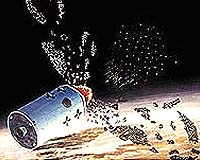 |
Bethesda MD (SPX) May 18, 2009 Entrepreneurs can smell an opportunity to make money. Some have a sixth sense and others have to work at it. But, all have something in common; they want to turn an idea into a profit. Many potential opportunities are connected to a negative event. Such events often create an imperative to correct a situation. Today, we are on the threshold of an event that may prove to be devastating to the future of the world's access and use of space. That event is the growing cancer of space debris. Every operational satellite is already at risk of a catastrophic collision with debris, and that risk is growing. The growth of debris poses an increasing threat to navigation, communications, defense and scientific spacecraft that must be stopped and reversed. Time is running out! Experts estimate that a chain reaction of debris collisions with each other and with operating satellites will lead to a thick spherical shell of debris engulfing near-Earth space and preventing satellites from operating in low and high orbits. No one knows when this will happen, but estimates range from a decade to 20 years. It could happen sooner; we just don't know. Nevertheless, we do know that, left alone, the debris menace will overwhelm our ability to deal with it. In fact, in some ways, it has already overwhelmed our capabilities. This is bad news for the world space community. But, it could be good news for some entrepreneurs because the mitigation and remediation of space debris is a growth industry that is in its infancy. Now may be the time for those swashbuckling, IPO wheeling, wide-eyed raisers-of-money to come out of the dot-bomb shadows and start to create new companies that sell debris cleanup services to the international space community. There is little doubt that space must be cleaned up and the cost will be astronomical. This may be that moment in history when the first billionaire is created by developing a plan to save space for generations to come. How can anyone make money eliminating space debris? There are several possible innovative ideas out there. For example, borrowing an idea from the Obama Administration, all spacefaring nations might collect a "debris footprint" tax on every new satellite. Each satellite owner might be required to pay an amount equal to a large fraction of the original cost of the satellite, plus launch costs. Typically, in today's world, this may amount to tens of millions of dollars, because the cost of removing the satellite and its debris will surely cost at least several mission dollars. Imagine collecting an average tax of $25 million per satellite. There are typically 125 satellites launched each year. Thus, over $3 billion per annum would be collected, or something over $30 billion per decade. Presumably, these taxes would be used to pay for clean up services. Surely there is a cleaver entrepreneur out there who can figure a way to leverage technology, excess space assets and financial management into a lean and mean debris collection machine. Of course, the governments of the world could simply decide to pay the existing aerospace contractor community to clean up space. But experience tells us that the right entrepreneur can do it cheaper, better and faster. So, where are you, Mr. Entrepreneur? Share This Article With Planet Earth
Related Links Launchspace Space Technology News - Applications and Research
 Chinese space debris passes shuttle uneventfully: NASA
Chinese space debris passes shuttle uneventfully: NASAHouston, Texas (AFP) May 13, 2009 A small piece of debris from China's 2007 anti-satellite test passed by the space shuttle Atlantis, but not close enough to require an evasive maneuver, NASA said Wednesday. "No action was required," said Pat Ryan, a US space agency spokesman in Mission Control. The 10-centimeter-long (four-inch) object, which was being tracked by the Pentagon, was projected to pass within three kilomete ... read more |
|
| The content herein, unless otherwise known to be public domain, are Copyright 1995-2009 - SpaceDaily. AFP and UPI Wire Stories are copyright Agence France-Presse and United Press International. ESA Portal Reports are copyright European Space Agency. All NASA sourced material is public domain. Additional copyrights may apply in whole or part to other bona fide parties. Advertising does not imply endorsement,agreement or approval of any opinions, statements or information provided by SpaceDaily on any Web page published or hosted by SpaceDaily. Privacy Statement |